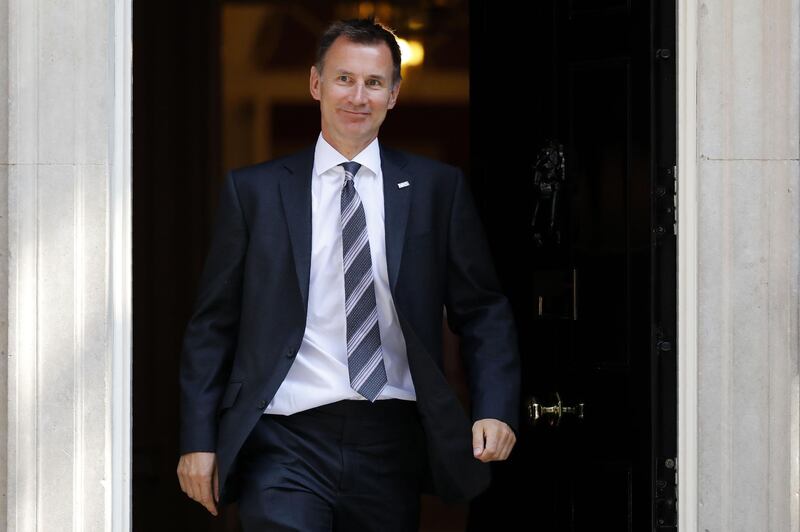The role of health secretary provides an unlikely schooling for the job of Britain's top diplomat, but along the way, Jeremy Hunt has shown an interest in Middle East affairs.
The new British foreign secretary has taken strong stances on Palestine — both the destruction of Arab villages and the United States embassy move — as well as the detention of Nazanin Zaghari-Ratcliffe and the outlawing of Hezbollah.
One commentator who knows Mr Hunt said that while he was often hard to pin down on issues he was unfamiliar with, the 51-year-old former businessman has a reputation for clear and decisive thinking. "He will present a more conventional face of British diplomacy," the source said.
Certainly, Mr Hunt subscribes to the growing constituency backing a ban on Hezbollah in Britain. A Foreign Office consensus that Hezbollah's political activities could be distinguished from its militia and overseas terror network has in recent months broken down.
In a statement, Mr Hunt indicated his support for a reversal of government policy and proscription of the entire organisation. "Hezbollah's beliefs are outrageous, disgusting, and should be condemned at every opportunity," the statement said. "I deplore the group in its entirety. The UK Government has long held the view that elements of Hezbollah have been involved in conducting and supporting terrorism and, as a result, proscribed Hezbollah's External Security Organisation in 2001, and in 2008 proscription was extended to include the whole of Hezbollah's military apparatus.
"A decision to proscribe an organisation is done on the recommendations submitted by law enforcement agencies, security services here and intelligence services overseas. However, it is crucial that we constantly monitor these groups and individuals involved in them, and review the use of proscription as a means to take action where we see fit."
Mr Hunt also responded to an outcry over the recent dispatch of Israeli bulldozers to level parts of Khan Al-Ahmar. "Demolitions and evictions of Palestinians from their homes cause unnecessary suffering to ordinary Palestinians; call into question Israel's commitment to a viable two-state solution; and, in all but the most exceptional cases, are contrary to International Humanitarian Law," a statement on his website said.
The son of an admiral in Royal Navy, Mr Hunt is public school-educated and he attended Oxford University at the same time as former prime minister David Cameron. Unusually for a British foreign secretary, he speaks a non-European language, Japanese. His wife Lucia was born in China.
The entrepreneur was a co-founder of the online education outfit Hot Courses, from which he has drawn tens of millions in dividends in recent years.
As health secretary he survived numerous crises over the public health system, the NHS and recently presided over celebrations of its 70th birthday. He has proven spurs as a bureaucratic fighter, recently winning the social care portfolio back to oversee, alongside health.
Mr Hunt has also spoken of the importance and urgency of resolving the Yemen conflict and has stressed the importance of working alongside allies in the Arab Coalition, the UAE and Saudi Arabia, in achieving a resolution.
Alistair Burt, the junior minister for Middle East and North Africa, endorsed the appointment, having worked with Mr Hunt at the Department of Health before returning to the Foreign Office after the 2017 general election. "Delighted to welcome Jeremy to the FCO," he tweeted. "Great appointment."






